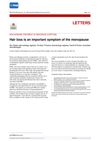 2 citations,
June 2022 in “International Journal of Biomedicine”
2 citations,
June 2022 in “International Journal of Biomedicine” The review suggests a comprehensive approach to treat hirsutism, focusing on hair removal, medication, and managing emotional effects.
2 citations,
July 2021 in “The journal of investigative dermatology/Journal of investigative dermatology” Sex hormones likely don't affect atopic dermatitis in adolescents and adults.
 2 citations,
July 2018 in “Journal of Cosmetic Dermatology”
2 citations,
July 2018 in “Journal of Cosmetic Dermatology” Common latent viruses might contribute to male-pattern baldness by disrupting cell processes that normally suppress hair loss-related proteins.
 2 citations,
September 2017 in “Archives of Medical Science”
2 citations,
September 2017 in “Archives of Medical Science” Finasteride affects offspring's antioxidant enzymes in epididymis, possibly disrupting sperm maturation.
 2 citations,
September 2014 in “Journal of The American Academy of Dermatology”
2 citations,
September 2014 in “Journal of The American Academy of Dermatology” Obesity may worsen hair loss in men and increase hirsutism in overweight or obese individuals, with weight loss recommended for treatment.
 2 citations,
January 2014 in “Springer eBooks”
2 citations,
January 2014 in “Springer eBooks” Polycystic Ovary Syndrome (PCOS) often leads to severe acne, and lifestyle changes and hormonal treatments can help manage it.
 2 citations,
November 2012 in “InTech eBooks”
2 citations,
November 2012 in “InTech eBooks” The document concludes that sex hormones are crucial for mammalian reproduction, health, and behavior, and require more research for therapeutic use.
 2 citations,
September 2012 in “PubMed”
2 citations,
September 2012 in “PubMed” Topical minoxidil effectively treats Female Pattern Hair Loss in women of all ages and hormone levels, but evidence for antiandrogens is limited.

research Acne
2 citations,
May 2011 in “Harper's Textbook of Pediatric Dermatology” Acne is a common skin condition linked to diet, hormones, and genetics, and early treatment can prevent scarring.
 2 citations,
January 2004 in “Enshou saisei”
2 citations,
January 2004 in “Enshou saisei” Male pattern baldness is caused by certain cells in hair follicles and could potentially be treated by targeting a specific growth factor, TGF-β1.
 2 citations,
September 2002 in “Journal of Endocrinological Investigation”
2 citations,
September 2002 in “Journal of Endocrinological Investigation” The GH-IGF-I axis is likely involved in the hormonal imbalances seen in non-obese women with functional hyperandrogenism.
 2 citations,
May 1999 in “PubMed”
2 citations,
May 1999 in “PubMed” Hyperandrogenism in women can cause acne, hair growth, hair loss, irregular periods, and increase the risk of infertility and diabetes.
 2 citations,
October 1998 in “Family Practice”
2 citations,
October 1998 in “Family Practice” New oral treatment, finasteride, effectively and safely treats common hair loss.
 2 citations,
January 1970 in “Asian journal of pharmaceutical research and development”
2 citations,
January 1970 in “Asian journal of pharmaceutical research and development” PCOS is a hormonal disorder affecting many women, leading to symptoms like acne and irregular periods, and increasing the risk of diabetes and heart disease.
1 citations,
August 2021 in “Arhivʺ vnutrennej mediciny” Hormonal imbalances can cause hair loss, and understanding them can help develop better treatments.
 1 citations,
April 2021 in “Undergraduate Research in Natural and Clinical Science and Technology (URNCST) Journal”
1 citations,
April 2021 in “Undergraduate Research in Natural and Clinical Science and Technology (URNCST) Journal” PCOS can harm heart health by increasing risks like high blood pressure and diabetes, but treatments like birth control and lifestyle changes can help.
 1 citations,
April 2021 in “Journal of Cardiovascular Pharmacology”
1 citations,
April 2021 in “Journal of Cardiovascular Pharmacology” Testosterone plays a big role in heart and nervous system damage caused by inflammation in male rats, suggesting that blocking testosterone production could help manage this condition.
 1 citations,
March 2021 in “The Journal of Sexual Medicine”
1 citations,
March 2021 in “The Journal of Sexual Medicine” The letter suggests testosterone replacement therapy might worsen COVID-19 outcomes.
1 citations,
March 2021 in “F1000Research” Plant-based compounds might be effective, low-side-effect treatments for prostate cancer by blocking a specific enzyme.
 1 citations,
March 2021 in “Dermatological reviews”
1 citations,
March 2021 in “Dermatological reviews” AGA, a common hair loss, is caused by genetics, hormones, age, and environmental factors.
1 citations,
January 2021 in “Journal of V. N. Karazin Kharkiv National University: Series Medicine” Nonandrogenic factors like oxidative stress and microinflammation are important in hair loss progression.
1 citations,
October 2020 in “Galen Medical Journal” Bald men may have a higher risk of heart disease, but baldness doesn't necessarily mean more severe heart disease.
 1 citations,
September 2020 in “Journal of the Endocrine Society”
1 citations,
September 2020 in “Journal of the Endocrine Society” Men have worse COVID-19 outcomes than women due to genetic and hormonal differences.
 1 citations,
May 2020 in “Reproductive Endocrinology”
1 citations,
May 2020 in “Reproductive Endocrinology” The document concludes that hair loss and acne in women can be due to both androgen-related and unrelated causes, requiring a collaborative treatment approach.
 1 citations,
October 2019 in “مجله كليه طب الكندي”
1 citations,
October 2019 in “مجله كليه طب الكندي” Dapsone gel 5% is effective and safe for treating acne.
 1 citations,
September 2018 in “Australasian Journal of Dermatology”
1 citations,
September 2018 in “Australasian Journal of Dermatology” A boy with GAPO syndrome had hair loss similar to male pattern baldness without hormone issues, possibly due to skin or blood vessel problems.
 1 citations,
January 2018 in “BMJ”
1 citations,
January 2018 in “BMJ” Many women experience significant hair loss during menopause, and topical minoxidil is an effective treatment.
 1 citations,
October 2017 in “Elsevier eBooks”
1 citations,
October 2017 in “Elsevier eBooks” Antiandrogens can treat female hormonal conditions, but environmental ones may harm reproductive health.
 1 citations,
January 2017 in “International Journal of Trichology”
1 citations,
January 2017 in “International Journal of Trichology” Psychological stress and personal history are significant factors in hair loss.
 1 citations,
July 2016 in “British Journal of Dermatology”
1 citations,
July 2016 in “British Journal of Dermatology” Men with a certain type of hair loss often use facial moisturizers, and a specific antibiotic treatment may help another hair condition.

























